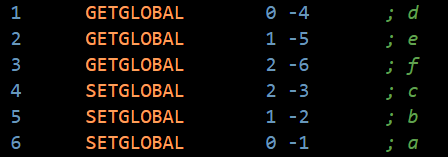| lua-l archive |
|
|
||
|

> Recently I've been working on a C# lua compiler from scratch, and I'm
> interested in understanding better how register allocation is done in Lua.
> I'm a bit confused in a few scenarios and how the compiler knows where to
> allocate, mainly as I couldn't find any documentation on lua's compiler.
Register allocation in Lua is done basically in a stack approach.
(Actually, several instructions use the registers as a stack.)
There is no optimizations at all, as there are plenty of registers.
During compilation there is a "top" variable (field FuncState.freereg in
the current version); when an _expression_ needs a register it increments
that counter, which is decremented after that result has been used.
-- Roberto